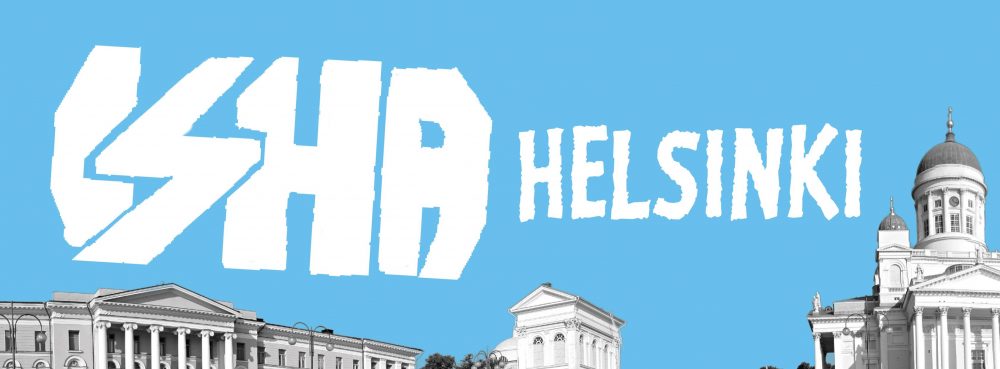 WELCOME | PROGRAM | WORKSHOPS | APPLYING | CONTACT | FAQ | PARTNERSHIPS
WELCOME | PROGRAM | WORKSHOPS | APPLYING | CONTACT | FAQ | PARTNERSHIPS
ISHA Helsinki and ISHA-Turku are organising together a local weekend-long ISHA seminar in Helsinki 13.–16.11.2014. The Theme of the Seminar is “BORDERS – The Diverse Concept of Border in History”. Friday 14th will consist of lectures and sitsit party in the evening; Saturday 15th is for workshops and farewell party.
Local ISHA sections: The workshop application period for local ISHA sections is in October. The seminar and the other activities are open and free to everybody, but local people have to apply to the workshops too. Take note that the workshops are optional and there is no participation fee for local people. The sitsit party will cost 15 euros.
Thursday 13.11.
Arrivals
19.00 Ice Breaking Party [Sivistys rooftop sauna, Leppäsuonkatu 11]
Friday 14.11.
10.00 Lectures [Mannerheim hall NSH]
# 10.15 PhD Mika Suonpää:The Concept of Transnationalism in Historical Research
# 11.15 MA Tim Clogan: China’s ‘Assertive’ South China Sea Policy and Rhetoric: Proactive, Reactive or Myth?
12.30 Lunch
13.45 Lectures [Mannerheim hall NSH]
# Short ISHA introduction
# 14.00 PhD Johanna Rainio-Niemi: From Empires to Small States and Beyond: Borders and Identities in European Histories
Coffee Break
# 15.30 PhD Risto Marjomaa: Borders – from Gatherer-hunters to the Global Age
17.00 Dinner
19.00 Sitsit party
Saturday 15.11.
10.00 Workshops [3rd floor NSH]
12.00 Lunch
13.00 Workshops
19.00 Farewell party
Sunday 16.11.
Departures
Program may change.
Globalization hasn’t removed the boundaries between states – actually more borders, walls and barriers have been set than ever before. There are different kinds of borders: physical, mental, legislative, natural – and they keep fluctuating.
1. STATE BORDERS
Sometimes the borders of nation-states can be unclear and controversial, causing conflicts and disintegration. In some places, borders have been unclear for centuries and the formation of the new borders can be hard to predict. Many of the existing borders are the result of the old western imperialist rule, that often neglected ethnic, linguistic and religious divisions. Maps can be misleading: some borders might have in reality ceased to exist, while some states are not acknowledged in them. This workshop will examine the complicated nature of borders between states. (Moderator(s): Aleksi)
2. INCLUSION AND EXCLUSION
How are the people on the other side of the border viewed? How does the border define them? How about the people on this side? This workshop intends to unravel how the border becomes part of cultural and political identity and how principles of inclusion and exclusion are at work. (Moderator(s): Daniel)
3. MULTINATIONAL CORPORATIONS & ORGANISATIONS
This workshop is about organisations and corporations concerning economics, religion and other human cooperations over national borders. What kind of laws apply to multinational corporations and associations and how have they developed in time? How have kingdoms and nations affected organisations and vice versa? This workshop investigates how people have gathered together over national borders.(Moderator(s): Maija)
4. BORDERS AND ECONOMICS
What kind of influence do borders have on economical policies? When neighboring countries have different jurisdiction it is common that business seeks to a more financially productive areas. This can be a decisive factor in the import and export of a country. Border policies regarding economics have played a key role in EU policies, how about this point of view? Border areas often also form big market areas due to logistical reasons – how have border policies influenced these border market areas? (Moderator(s): Henri)
5. NATURAL BORDERS
How have the natural borders affected the formation of early states? How did the natural borders, like mountains, set the boundaries to the progress of a civilization? What kind of environmental borders has mankind created itself? This workshop tries to find how the environmental surroundings have affected the human socities and how the socities have tried to cross the boundaries of nature. (Moderator(s): Teemu)
A) Application period for ISHA sections outside Finland: 22.–26.9.2014. The application form opens CEST 11 AM and closes on the last day CEST 00 AM. The intake will be maximum 15 participants from outside Finland. Participation fee will be 25 euros. Participation fee includes meals for friday/saturday and the accommodation.
Two people in total applied and they were both chosen:
Lena (ISHA Gratz)
Maria (ISHA Gratz)
They have been notified through email. Welcome!
B) Application period for ISHA Helsinki/Turku: application period for the workshops is in October.
CONTACT
If you have any questions, contact us at
isha-hallitus[at]helsinki.fi
What is an ISHA Seminar?
ISHA Seminar is an academic event, where you meet other history students from all over the world. Seminar usually consists of academic workshops and social evenings.
What is a workshop?
Workshop is part of the academic content of the seminar. In workshop, the participants keep presentations and discuss the workshop’s topic and each others’ presentations. The workshops are moderated by local students appointed by the organisers.

